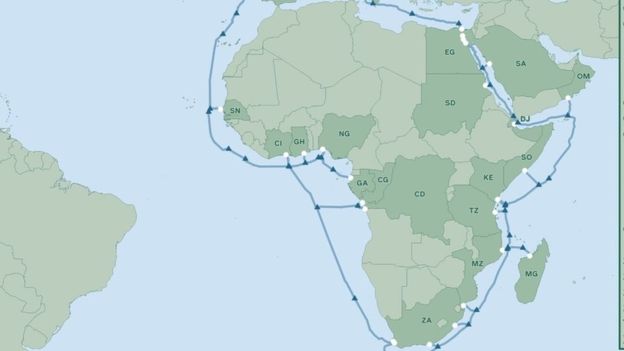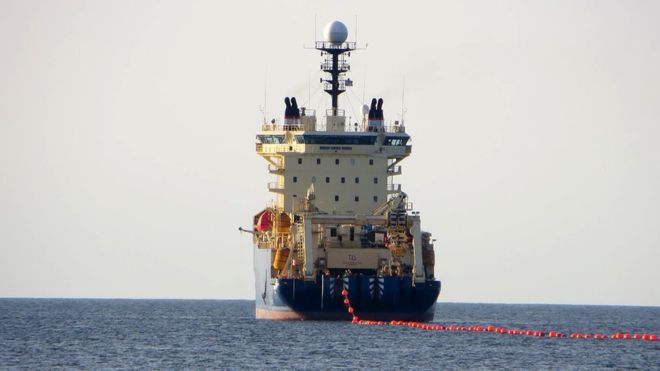Facebook is teaming up with telecoms companies to build a 37,000km (23,000-mile) undersea cable to supply faster internet to 16 countries in Africa.
Its length - almost equal to the circumference of the Earth - will make it one of the longest, it said.
It is part of a long-running bid by Facebook to take its social media platform to Africa's young population.
Ready for use by 2024, it will deliver three times the capacity of all current undersea cables serving Africa.
"When completed, this new route will deliver much-needed internet capacity, redundancy, and reliability across Africa, supplement a rapidly increasing demand for capacity in the Middle East, and support further growth of 4G, 5G, and broadband access for hundreds of millions of people," said Facebook in a blog.
Africa lags behind the rest of the world when it comes to internet access, with four in 10 people across the continent having access to the web, compared with a global average of six in 10.
But the continent represents huge opportunities for technology firms and businesses with its population of 1.3 billion.
The cost of the 2Africa project - which will connect Europe and the Middle East to the continent - has not been disclosed but Bloomberg reported it could be close to $1bn (£820m).

Sub-sea cables carry the vast majority of the world's inter-continental data. They can handle much more data and offer faster transmission at a lower cost compared with other methods.
The cable - which will be built by Nokia Oyj's Alcatel Submarine Networks - will run along the bottom of the Atlantic Ocean, the Indian Ocean, the Mediterranean Sea and the Red Sea.
It will be buried deeper than previous systems for greater protection against external damage from things such as ships' anchors.
The fibre-optic cables will have double the capacity of older ones, making use of Spatial Division Multiplexing (SDM1) technology.
Facebook is teaming up with Johannesburg-based MTN Group, Telecom Egypt, Vodafone and Orange SA.
Vodafone said it would pave the way for developing digital businesses on the continent.
"We need to ensure that there is enough internet capacity to not only get people online, but to help build a modern digital society that includes services that require a large amount of data transfer, such as cloud computing or video," said Nick Gliddon, director of Vodafone Carrier Services.
As well as helping businesses, it will also improve healthcare and education, he added.
Latest Stories
-
CLOGSAG vows to resist partisan appointments in Civil, Local Government Service
18 minutes -
Peasant Farmers Association welcomes Mahama’s move to rename Agric Ministry
20 minutes -
NDC grateful to chiefs, people of Bono Region -Asiedu Nketia
22 minutes -
Ban on smoking in public: FDA engages food service establishments on compliance
23 minutes -
Mahama’s administration to consider opening Ghana’s Mission in Budapest
25 minutes -
GEPA commits to building robust systems that empower MSMEs
27 minutes -
Twifo Atti-Morkwa poultry farmers in distress due to high cost of feed
29 minutes -
Central Region PURC assures residents of constant water, power supply during yuletide
30 minutes -
Election victory not licence to misbehave – Police to youth
32 minutes -
GPL 2024/2025: Nations thrash struggling Legon Cities
35 minutes -
Electoral offences have no expiry date, accountability is inevitable – Fifi Kwetey
35 minutes -
Ghanaians to enjoy reliable electricity this Christmas – ECG promises
42 minutes -
Police deny reports of election-related violence in Nsawam Adoagyiri
46 minutes -
‘We’re not brothers; we’ll show you where power lies’ – Dafeamekpor to Afenyo-Markin
49 minutes -
EPA says lead-based paints are dangerous to health, calls for safer alternatives
3 hours

